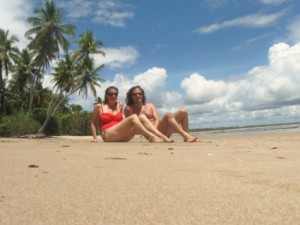
Photo © Michael Sommers.
In 1996, I moved to Brazil for the first time and spent six months living in Salvador. During this period my sister made her first trip to Brazil (excluding a quick pit stop in Rio de Janeiro in 1970 in the company of our parents). Together we took many trips around Bahia including to Morro de São Paulo, on the island of Tinharé, to which we’ll be returning later today – for the first time in 15 years.
To commemorate our anniversary of travels together throughout Brazil, I asked Annie to write a guest blog in which she shares impressions of traveling through Brazil with an expat brother; a phenomenon which is, no doubt, more and more common viewed our increasingly globalized world and mobile existences:
My brother has lived in Salvador for 13 years. This is my only brother, the person I may be the closest to on this entire planet. I live miles and kilometers away in the opposite hemisphere, in New York.Neither of us was raised in the places in which we currently live. We like and experience “elsewhere” with an unabashed ease and an acute attention to detail.
When I come to Brazil to visit my brother – and this may be my tenth time – I am repeatedly surprised to discover that, in a way, I feel very much at home.When I come to Brazil to visit my brother – and this may be my tenth time – I am repeatedly surprised to discover that, in a way, I feel very much at home. Yet, at the same time, I am also stymied by the fact that when I leave, I do so with a strong sense of going back to my home. Time and time again, I wonder: Why can’t Brazil be mine, if it is my brother’s?
This question is all the more compelling to me because although (to my moderate embarrassment) my Portuguese is rudimentary, when my brother speaks, because I know him so well, I feel that I understand what he is saying. Regardless of whether he’s talking to friends, a restaurant owner, or a taxi driver, I can usually grasp the subjects being discussed. In this way, I am learning the language, word by word, exclamation by exclamation via my intuitive understanding of someone I know so well that, at times, we seem to be twins. Ultimately, the mere act of traveling through Brazil with my brother sometimes fools me into thinking that this is a place I know too.
We journey by boat, bus, plane, and taxi. We walk a lot. And at each moment I think: “This is my brother, the Brazilian.” At every turn, I am receiving an insider’s perspective of a culture that is not really mine. It’s like looking through a kaleidoscope and seeing each detail enlarged and rendered more sharply until it becomes a full sensory experience as opposed to merely a visual treat.
As such, I can taste more intensely the freshness of the fish caught just this morning off the beach of Moreré. And despite my linguistic limitations, I can comprehend my brother’s friends (his “Brazilian family”), whom I’ve known for years; a touch on the arm or a warm embrace is enriched with larger sentiments that speak as subtly and powerfully as words.
The more solitary moments I experience traveling in Brazil, those seen through my own lens, are often filled with wonder. Sometimes they also bear a small degree of humorous stupidity on my part.
For example, unaccustomed to the bright moon-lit sky of the Bahian coast, I stare up at the stars and spend minutes deciding whether a low-slung, especially bright light is an airplane or a star (I live in Queens, not far from LaGuardia airport). Finally deducing that it’s a star, I feel pleased with myself for recognizing the universe’s continuing themes on another continent. Later, when my brother alerts me to the fact that my airplane-turned-star is Venus, which he has been gazing upon for years, I am in awe that this fact is not apparent to me too. I’m amazed that I actually live below a different sky; one more often filled with airplanes and the reflection of millions of bright city lights than visibly shining stars.
On another occasion, strolling through the Quadrado, a vast lawn in the center of Trancoso, my brother is entranced by the beauty of the whitewashed church framing the square originally built by 16th-century Jesuits. Fully immersed in the history of his adopted country, it’s a heady moment for him.
I, meanwhile, am clueless. Instead, my attention is drawn to other seemingly “important” matters such as one of the many stray dogs in the area which happens to be completely pink. This must be some amazing species of canine native to this part of Bahia, I think. I congratulate myself on pointing out something “Brazilian” to my brother that he didn’t previously know, only to be told that the dog is a normal mutt, whose surreal pinkness is the result of medical treatment. My sense of discovering a new species immediately dashed, I am left with a keen awareness that my Brazil remains that of a foreign visitor (albeit with a vivid imagination).
While I have a special “in” due to my brother, my own sensitivities and curiosity color my travels throughout Brazil as they would in terms of any destination. Meanwhile, my limited Portuguese prevents me from integrating more fully into the deeper fabric of the country. After years of visiting, twin or no twin, I can’t make my brother’s country my own unless I spend more time here and learn the language. The mystery is solved. But, this is a good thing, because it provides me with an incentive to keep on coming back.